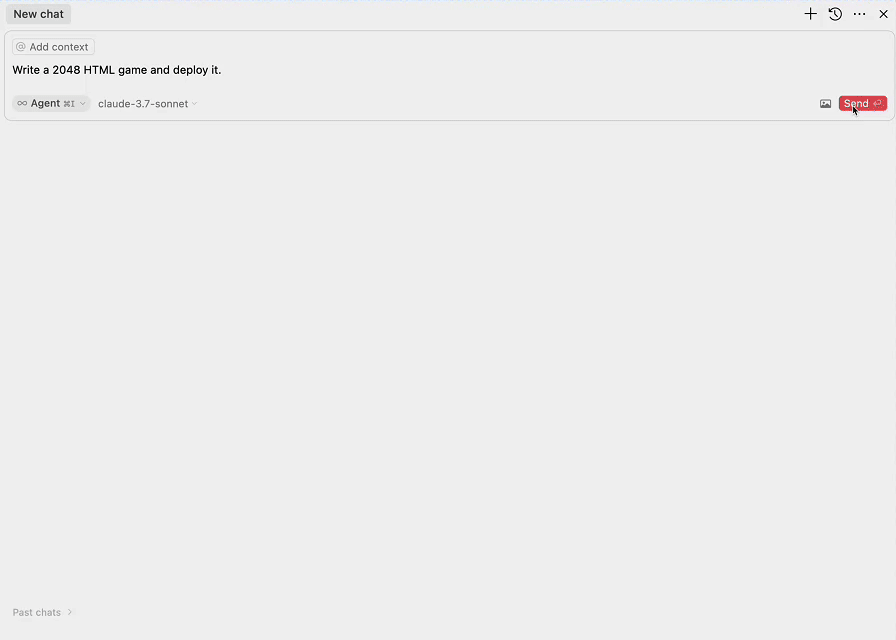About
An MCP service that lets you deploy static HTML, folders, or full‑stack projects to EdgeOne Pages and receive a public URL. It supports both Node.js command‑line usage and HTTP streaming clients.
Capabilities

EdgeOne Pages MCP is a specialized Model Context Protocol service that turns AI‑generated web content into instantly accessible, edge‑served URLs. By bridging the gap between an LLM’s output and a global CDN, it lets developers publish static pages, folders, or full‑stack projects directly from their AI workflows without manual deployment steps. The service eliminates the need for separate build pipelines, server configuration, or continuous integration setups—only a single MCP call is required to push content to EdgeOne Pages and receive a public link.
The server exposes two primary tools: for quick, single‑page deployments and (or ) for full website projects. When an LLM generates HTML, the MCP server receives it via the tool, uploads the content to EdgeOne KV storage through the EdgeOne Pages API, and automatically constructs a short, globally cached URL. For larger projects, packages the entire directory (or zip file) and deploys it as a full‑stack application on EdgeOne Pages Functions, enabling serverless JavaScript/TypeScript execution at the edge. Both tools return URLs that are immediately usable in browsers, ensuring developers can iterate rapidly on web prototypes or content generated by AI assistants.
Key capabilities include:
- Zero‑configuration deployment: No need to set up servers or CI/CD pipelines; the MCP server handles API authentication and project creation.
- Edge‑first delivery: Content is stored in EdgeOne KV and served from the nearest edge location, guaranteeing low latency for global audiences.
- Automatic project management: The server can create new EdgeOne Pages projects or update existing ones by supplying a project name, simplifying version control and collaboration.
- Support for full‑stack projects: The tool allows deployment of dynamic applications that run on EdgeOne Pages Functions, not just static HTML.
- HTTP streaming compatibility: For clients that prefer HTTP streams, a dedicated server endpoint is available, enabling real‑time deployment feedback.
Real‑world scenarios where EdgeOne Pages MCP shines include:
- Rapid prototyping: A product manager asks an AI assistant to generate a landing page; the MCP server instantly publishes it for stakeholder review.
- Content generation pipelines: A marketing team uses an LLM to produce blog posts, then deploys them as static pages with a single API call.
- Serverless app iteration: Developers iterate on full‑stack applications locally, then push the entire folder to EdgeOne Pages for instant edge deployment and testing.
- Custom domain integration: The open‑source server can be self‑hosted and bound to a custom domain, giving teams full control over branding while leveraging edge performance.
EdgeOne Pages MCP offers a streamlined, AI‑centric deployment experience that removes traditional friction points. By converting LLM output into edge‑served web content with minimal configuration, it empowers developers to focus on creativity and functionality rather than infrastructure, making it a standout tool in the growing ecosystem of AI‑driven web development.
Related Servers
MarkItDown MCP Server
Convert documents to Markdown for LLMs quickly and accurately
Context7 MCP
Real‑time, version‑specific code docs for LLMs
Playwright MCP
Browser automation via structured accessibility trees
BlenderMCP
Claude AI meets Blender for instant 3D creation
Pydantic AI
Build GenAI agents with Pydantic validation and observability
Chrome DevTools MCP
AI-powered Chrome automation and debugging
Weekly Views
Server Health
Information
Tags
Explore More Servers
TheHive MCP Server
Bridge AI assistants to TheHive incident response
Hacker News MCP Server
Instant access to Hacker News data via Model Context Protocol
Spring MCP User Management Server
Java 21 Spring Boot server for AI assistant user tools
Apache Gravitino(incubating)
MCP Server: Apache Gravitino(incubating)
Neo4j MCP Chainlit
Chatbot interface for Neo4j with Claude LLM
Red Hat Insights MCP Server
Unified access to Red Hat Insights services via MCP